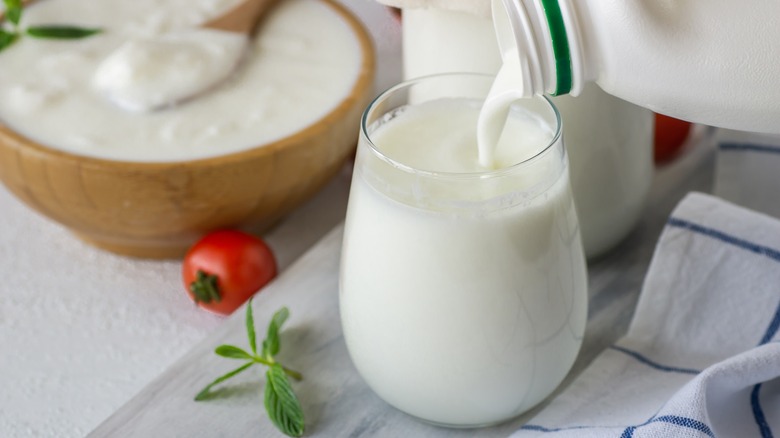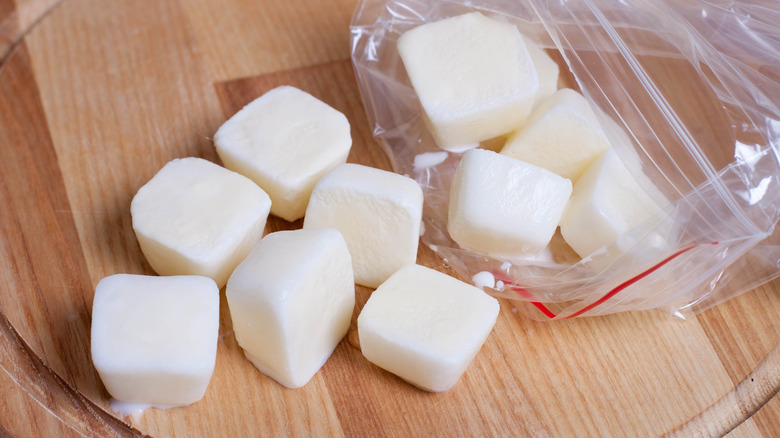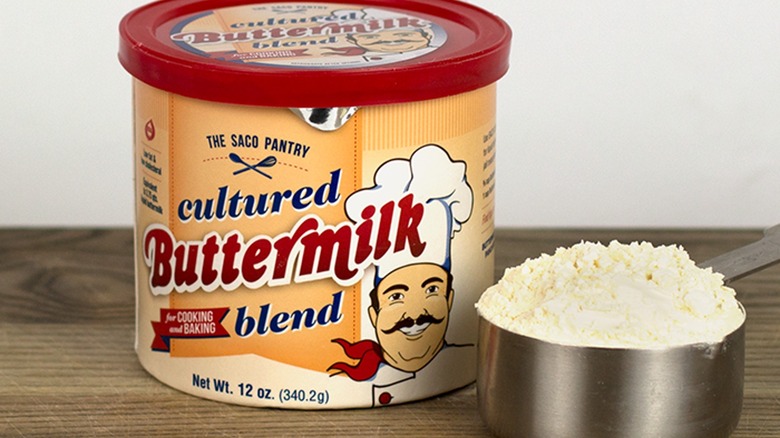How Long Is Buttermilk Good For Once It's Opened
When making a batch of buttermilk biscuits or a stack of fluffy buttermilk pancakes, there is one ingredient you can't substitute. But most recipes that call for buttermilk only require up to a cup, leaving you with almost a full carton you may not have any immediate plans for. The question at that point is how long will the buttermilk be good for.
Unfortunately, buttermilk does not have a very long shelf life. An unopened container of buttermilk is good for up to 14 days after its "best-by" date, depending on how it is stored. Once the carton is open, the buttermilk will be good for two weeks.
The process for making cultured buttermilk — what is sold in most grocery stores and differs from traditional buttermilk — is similar to how you make yogurt. Salt, citric acid, and bacterial cultures combine with skim milk and ferments for 14-16 hours. The sugars in the milk turn into lactic acid, which gives buttermilk its distinct tangy flavor. Buttermilk lasts about twice as long as regular milk because the lactic acid fights off bacteria until it degrades in the product, which eventually happens and causes the buttermilk to spoil. If buttermilk is discolored or has a strong, sour odor, it is best to throw it out. Consuming spoiled buttermilk can cause food poisoning, which may result in nausea, diarrhea, and vomiting.
Ways to extend its shelf life
The best way to increase the shelf life of buttermilk is to keep it cold as long as possible. Like most dairy products, you should store buttermilk below 40 degrees Fahrenheit. The longer it sits at room temperature, the more rapidly it can spoil. Limiting how long a container of buttermilk sits on the counter after you measure some out is crucial to extending its shelf life as much as possible.
If you find yourself with buttermilk approaching its end date and don't have the time to use it up, you can freeze it. Frozen buttermilk is good for 3 months. So long as the container is not completely full and the liquid has room to expand when frozen, you can freeze it in the container you purchased it in. However, considering that most recipes only call for a minimal amount of buttermilk, a better way to freeze it is to divide it into small increments. Fill a freezer-safe plastic bag with 1/4 cup, 1/2 cup, and full cup measurements, and label the bag with the date and measurement. The next time you need some for a recipe, you'll have exactly the amount you're looking for, and won't be thawing and re-freezing an entire container to get what's needed.
Alternatives that work
While it's wonderful that buttermilk lasts longer than regular milk, the problem is there aren't as many uses for buttermilk. If regular milk is approaching its end, you can always pour yourself a glass or two and use it quickly. But buttermilk isn't typically something most people will drink on its own. Thankfully, if you want to avoid the hassle of keeping buttermilk from spoiling, utilizing some alternatives will allow you to have buttermilk any time you want.
One option you have is to make a small batch yourself. It requires a little more time than simply reaching into the fridge, but the recipe is easy to follow. Add a tablespoon of lemon juice or vinegar to 1 cup of milk and let it stand for a few minutes. Soon, you'll notice the milk curdling and taking on a thicker texture.
Another way to avoid worrying about the shelf life is to purchase powdered buttermilk. To add it to a dish, mix it in some water, and voila! You have the exact amount of buttermilk your recipe is calling for. Compared to the fortnight liquid buttermilk lasts, powdered buttermilk can be stored in the refrigerator for up to two years. The powdered version can help limit your food waste, and you won't have to worry about how long your buttermilk is good for when you bring some home.


